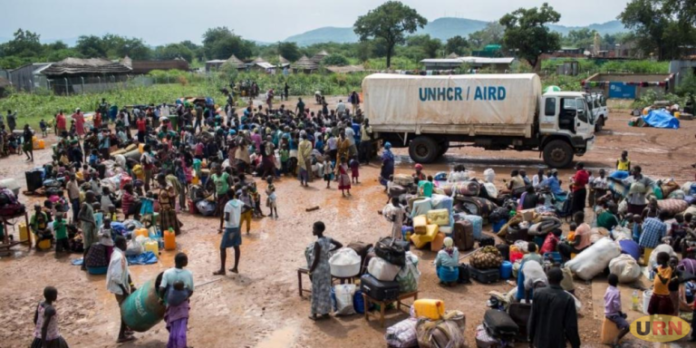This was revealed by a study conducted by Dr. Helen Liebling, Prof. Hazel Barrett both from Centre for Trust, Peace and Social relations at Coventry university plus Prof. Lillian Artz from the university of Cape Town- South Africa.
The findings of the study were revealed during the review on Health and Justice Responses to South Sudanese Refugees in Northern Uganda who have Survived Sexual and Gender-Based Violence (SGBV) and Torture on Tuesday 7th at the Uganda Virus Research Institute in Entebbe.
The research was carried out in three refugee settlement sites of Pagirinya, Mungula, and Bidi Bidi by the three researchers who are also long-term collaborators of Prof. Eugene Kinyanda, the head of the mental Health Focus Area of the MRC/UVRI & LSHTM Uganda Research Unit.
According to Dr. Hellen Liebling, refugees come to Uganda for safety after experiencing abuses but unfortunately, there were challenges in settlements in terms of security, sexual violence, and incidents of abduction of children.
“Most of the refugees we spoke to are not registered because of concern that perpetrators may come back from Sudan and cause them problems. So, most of the refugees don’t register for that reason,” she said.

Prof. Hazel Barrett (left) and Dr. Helen Liebling both from Centre for Trust, Peace and Social relations at Coventry university who conducted a study in refugee settlements
Dr. Liebling also noted that survivor refugees in settlements don’t get access to psychological health services and treatment because special services are not available due to limited funding.
“We propose that Refugee Civil Organisations (CBOs) should be active partners in informing and providing health and justice services to survivors. These organisations can ensure that traditional approaches to recovery, which build on refugees’ skills, are harnessed as well as providing culturally sensitive, age and gender-appropriate psycho-social group support and have strong relationships with faith-based groups that many refugees found helped them to become more resilient and gave them comfort,” the scolar recommended.
Professor Hazel Barrett of Coventry University, UK noted that research evidence showed that extending the use of mobile courts would improve access to restorative justice and compensation locally to survivors since most of them preferred to use traditional forms of justice (informal justice) and this right of choice should be respected.
“The mechanisms of traditional justice need to be better understood and integrated into the whole justice process because evidence showed that integration between formal and informal justice and physical and emotional well-being services is essential for the recovery, restoration of dignity and building the resilience of refugee survivors of sexual and gender-based violence and torture,” she added.
However, Christopher Angualia, the assistant settlement commandant in Bidi Bidi refugee settlement camp said, all the refugees that are registered and processed through official channels, are accorded all necessary security and safety within the camp.
“There are currently 197,378 refugees in Bidi Bidi camp, all settling in 75 villages and five zones. Their distribution is done through a criteria only known to us and whenever any of them expresses fear for their life, we even take them into our safe houses from where they are closely monitored and protected,” Angualia noted.
Irene Ecelai, the assistant settlement commandant for the Adjumani refugee desk intimated that some refugees inflict pain onto themselves and claim to have been attacked in order to be relocated from one settlement to another.
She added that some refugees who used to settle in Adjumani, were not going through the official facilitation desk at Elegu border or through Arua. “Adjumani being a border district to South Sudan, it can be very easy for tormentors to come after the individuals who are not registered as refugees,” she explained. According to Ecelai, there are 19 refugee settlements in Adjumani with over 200,000 refugees.
Prof Pontiano Kaleebu the Director of the Uganda Virus Research Institute, in his speech highlighted that the study was undertaken in 2018 in collaboration with the Refugee Welfare Councils, Refugee Law Project, and Kitgum Women’s Peace Initiative where 241 South Sudan Refugees were interviewed.

He also remarked that the world has recently witnessed the outbreak of war in the Middle East where so far more than 10,000 Palestinians and 1,400 Israelis have been killed and more than 1.5 million Palestinians displaced.
“Therefore we pray that all efforts are undertaken to bring to the negotiation table all sides involved in this conflict to stop this human suffering and I hope the deliberations and resolutions that have been made will contribute to reducing the physical and mental health suffering of refugees in Africa,” he concluded.
The Head of the Mental Health Focus Area of the MRC/UVRI & LSHTM Uganda Research Unit, Professor Eugene Kinyanda lauded Dr. Liebling for a long-term collaboration with UVRI that started way back in the 1980s to document the psychological and medical effects of war in Luwero, Gulu, Southern Sudan among others.
Prof. Kinyanda also appreciated the government of Uganda for opening its doors for refugees from all over Africa which puts it in a fourth position in the world with the biggest refugee population.
“The better health focus area as UVRI is undertaking the program to provide counseling which is led by peer counselors to urban refugees in Kampala,” he noted.
Meanwhile, Uganda hosts the largest refugee population in the Africa and the 4th in the world with close to 1.6 million refugees.
